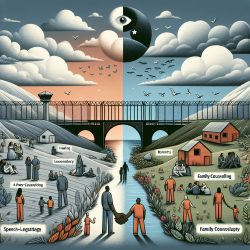Building Bridges of Hope: Supporting Families During Reentry
When a parent returns home from incarceration, families face a unique set of challenges. The study titled A time to ‘make amends and bring pieces together’: A phenomenological study of family experiences and considerations when a parent returns home from incarceration sheds light on these challenges and offers insights that can help practitioners improve outcomes for children and families.
As speech-language pathologists and online therapy providers, understanding the nuances of family dynamics during reentry is crucial. This research, conducted through in-depth interviews with families affected by incarceration, highlights three primary themes that practitioners should consider:
- Relationship-building obstacles: Families often struggle to redefine roles and rebuild relationships when a parent returns. Practitioners can facilitate this process by encouraging open communication and providing family counseling services.
- Unaligned family expectations: Discrepancies in expectations between family members can create tension. Offering parental education and access to reentry programs can help align these expectations and foster a supportive environment.
- Parole-related family burdens: Navigating parole restrictions can be overwhelming. Practitioners can advocate for transparent wrap-around social services to alleviate these legal challenges.
Implementing the outcomes of this research involves a multi-faceted approach:
1. Promote Family Counseling and Peer Support
Family counseling can be instrumental in helping families navigate the emotional complexities of reentry. Encouraging participation in peer support groups can also provide families with a sense of community and shared understanding.
2. Advocate for Access to Reentry Programs
Reentry programs that offer mental health services and parental education can significantly impact the reintegration process. Practitioners should guide families in accessing these resources to better align expectations and support children's well-being.
3. Address Parole-Related Challenges
By working with legal professionals and social services, practitioners can help families reduce the burdens associated with parole. This may involve advocating for policy changes that prioritize family stability and reduce recidivism risks.
For practitioners, this research emphasizes the importance of a holistic approach to supporting families during reentry. By integrating these strategies into practice, we can create environments where children thrive and families heal.
To read the original research paper, please follow this link: A time to ‘make amends and bring pieces together’: A phenomenological study of family experiences and considerations when a parent returns home from incarceration.










